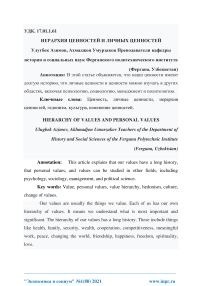Hierarchy of values and personal values
Автор: Azimov U., Umurzakov A.
Журнал: Экономика и социум @ekonomika-socium
Рубрика: Основной раздел
Статья в выпуске: 1-1 (80), 2021 года.
Бесплатный доступ
This article explains that our values have a long history, that personal values, and values can be studied in other fields, including psychology, sociology, management, and political science.
Value, personal values, value hierarchy, hedonism, culture, change of values
Короткий адрес: https://sciup.org/140258331
IDR: 140258331 | УДК: 17.01.1.61
Текст научной статьи Hierarchy of values and personal values
Our values can be contradictory. They create many paradoxes that need to be balanced and solved.
What are the values? Values refer to things that are good and worthwhile. They are communities such as nations, business organizations, and religious groups that have both individual and social character. Social values communities (often referred to as cultural values) represent the goals of social members, encourage collective disturbance, and serve to justify actions taken by the collective. People’s values (often called personal values) are common aspirational goals that motivate people to act and serve as a guiding principle. They become situations that, over time, affect people’s preferences and behaviors.
Personal values are studied primarily in other areas, including psychology. It is also studied in sociology, management and political science. Psychological research on personal values was introduced by Gordon Allport. Over the next 40 years, less attention was paid to the study of psychology values. Milton Rokich gave a new impetus to the appreciation of research by proposing that values serve as a guide. Thus, long lists of values can be generated.
At this point, Schwartz proposed a theory of universality in personal content and structure. After a presentation in 1992, the theory quickly gained recognition in the field. Schwartz argued that values could be organized according to their motivational goals. By analyzing people’s needs and requirements for community life, Schwartz identified ten values of different types of motivation: power, achievement, hedonism, motivation, selfgovernance, universalism, benevolence, tradition, conformism, and security.
Some of these values are mutually compatible, reflecting the goals they can achieve through the same actions or relationships at the same time. Values are structured, arranged in a circular constant according to the motives they express. Relevant values represent corresponding motives and opposite values represent opposite motives.
A change in values encourages autonomy of thought and action (selfmanagement).
Thus, the intercultural study of personal values reveals similarities in this regard. The meaning of values and similarities in the hierarchies of personal values in different cultures, however, this growing group of studies shows significant differences in values within and outside culture. Growing research suggests that preferences and clear behaviors affect the impact of self-esteem on relationships.
(дата обращения: 06.01.2021).
"Экономика и социум" №1(80) 2021
Список литературы Hierarchy of values and personal values
- Мадаминов Абдувахабжан Ахмаджанович Политическая культура студенческой молодежи в современном обществе // Вопросы науки и образования.2018. №1 (13). URL: https://cyberleninka.ru/article/n/politicheskaya-kultura-studencheskoy-molodezhi-v-sovremennom-obschestve (дата обращения: 06.01.2021).
- U.Azimov. A.Umurzakov.GLOBAL PROBLEMS AND GENERAL VALUES. EPRA International Journal of Multidisciplinary Research (IJMR) - Peer Reviewed Journal Volume: 6 | Issue: 7 | July 2020
- Ergashev U.A., Urinbaeva M.S., Umurzakov A.M. GLOBALIZATION AND ITS ALTERNATIVES. Проблемы современной науки и образования 2019.


